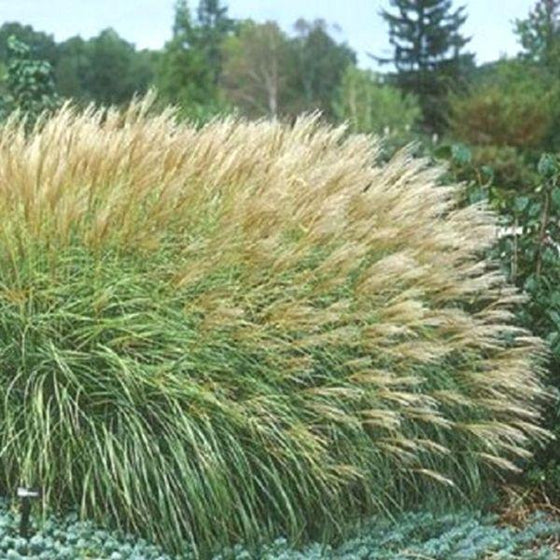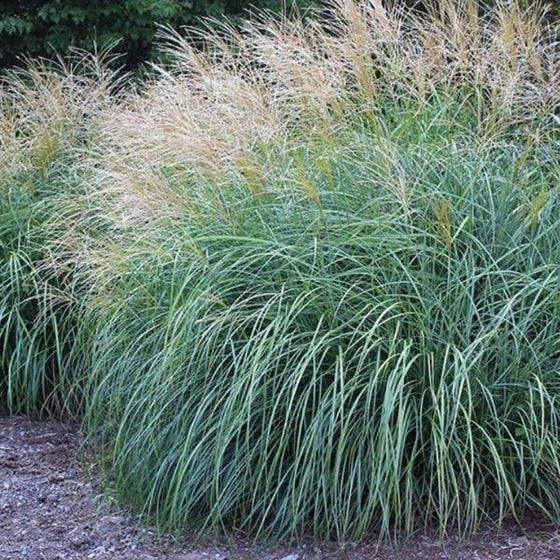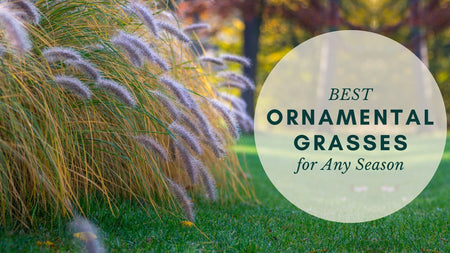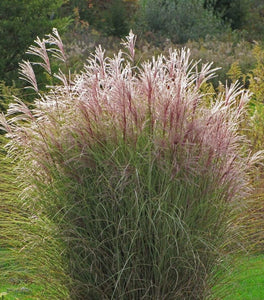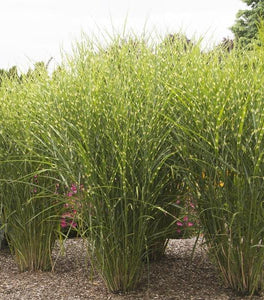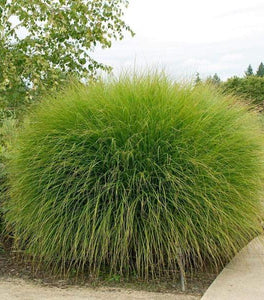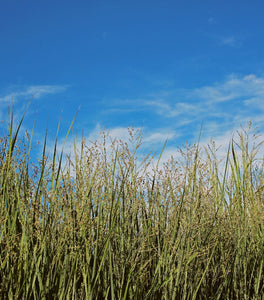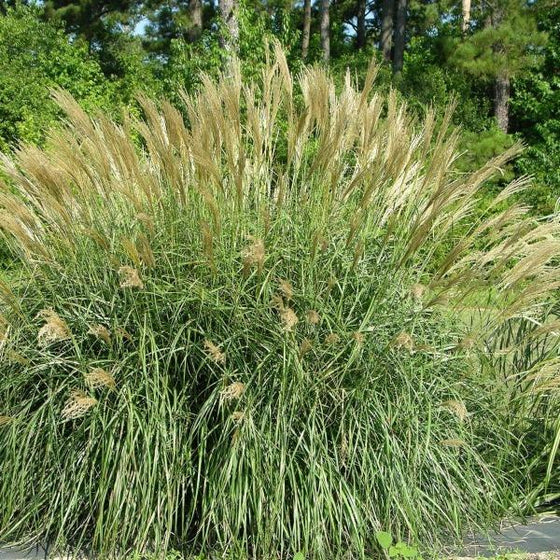
Images Depict Mature Plants
Miscanthus Adagio for Sale Online
Miscanthus 'Adagio' is a compact and elegant ornamental grass known for its fine, silver-green foliage and graceful, arching habit. This warm-season grass thrives in USDA Hardiness Zones 5-9 and reaches a mature height of 3-4 feet, with a spread of 2-3 feet, making it ideal for smaller garden spaces or as a border plant. In late summer, 'Adagio' produces airy, pink-tinged plumes that rise above the foliage, maturing to a soft, silvery-white, adding texture and movement to the garden. Its compact size and refined look make it a perfect choice for both formal and naturalistic landscapes.
Perfect for adding vertical interest, Miscanthus 'Adagio' thrives in full sun and well-drained soils but is adaptable to a variety of soil types. Once established, it is drought-tolerant and requires minimal care, making it an excellent low-maintenance option for busy gardeners. This ornamental grass works beautifully in mixed borders, mass plantings, or as a striking specimen plant. Its fine texture and soft plumes provide contrast when paired with larger-leafed perennials, while its upright, arching habit adds a touch of elegance to any garden setting.
In addition to its aesthetic appeal, Miscanthus 'Adagio' is deer-resistant and provides excellent year-round interest, as its foliage turns a lovely golden hue in fall and persists through winter. Its attractive plumes also provide food and shelter for birds in the colder months, enhancing the ecological value of your landscape. Whether used in garden beds, along walkways, or in containers, Miscanthus 'Adagio' offers versatility, beauty, and durability, making it a standout choice for any landscape design.
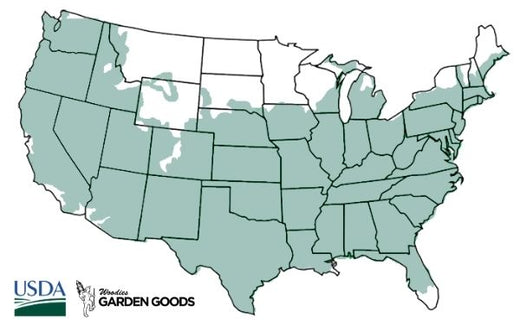
| Hardiness Zone: | 5-9 |
|---|---|
| Mature Height: | 3 to 4 Feet |
| Mature Width: | 2 to 3 Feet |
| Sunlight: | Full sun to part sun |
| Water Requirements: | Dry to moist once established |
| Selling Points: | Deer resistant, attracts birds, fall color, winter interest, cut flower |
How to Care for Miscanthus Adagio
Be sure to read our planting instructions to ensure a healthy and happy Miscanthus Adagio for years to come!
How Do I Plant Miscanthus Adagio?
To plant Miscanthus 'Adagio,' begin by selecting a location that offers full sun, as this ornamental grass thrives in bright light but can also tolerate partial shade. Miscanthus 'Adagio' prefers well-drained soil but is adaptable to various soil types, including sandy or clay soils. First, loosen the soil to a depth of 12-18 inches to ensure proper root penetration. Dig a hole that is twice the width of the root ball and deep enough so that the top of the root ball sits level with the surrounding soil. Place the grass in the hole, backfill with soil, and firm it gently around the base. After planting, water thoroughly to help establish the roots, and add a layer of mulch around the base to retain moisture and suppress weeds. When planting multiple Miscanthus 'Adagio' grasses, space them about 3 to 4 feet apart to accommodate their mature spread and allow air circulation. During the first growing season, regular watering is important to help the grass establish a deep, healthy root system. Once established, this ornamental grass becomes drought-tolerant and requires minimal care. Avoid overwatering, as it prefers slightly dry conditions after becoming established. By planting Miscanthus 'Adagio' in well-drained soil and following these steps, you’ll enjoy its graceful, arching foliage and stunning late-season plumes, adding texture and movement to your landscape.
How Do I Water Miscanthus Adagio?
To properly water Miscanthus Adagio, it's important to establish a consistent watering routine, especially during the plant's first growing season. After planting, water deeply to help the roots settle in and promote strong growth. For established plants, water when the top 2-3 inches of soil are dry. Miscanthus Adagio is relatively drought-tolerant, so it doesn't require frequent watering once established. However, in periods of prolonged drought or extreme heat, giving the grass a deep soak every week or two will keep it healthy. Avoid overwatering, as soggy soil can lead to root rot. During the cooler months, Miscanthus Adagio requires less water, as its growth slows down. In fact, as a warm-season ornamental grass, it enters a semi-dormant state in the winter, making additional watering unnecessary. If planted in a container, be mindful of checking the soil moisture more frequently, as pots tend to dry out faster than garden beds. Good drainage is key when watering Miscanthus Adagio, as standing water can damage the roots and prevent healthy growth. Proper watering ensures this ornamental grass maintains its graceful, arching foliage and vibrant, airy plumes throughout the growing season.
How Do I Fertilize Miscanthus Adagio?
To fertilize Miscanthus Adagio, start by applying a balanced, slow-release fertilizer in early spring, just as new growth begins to emerge. A 10-10-10 or 14-14-14 fertilizer works well for this ornamental grass, providing equal amounts of nitrogen, phosphorus, and potassium to encourage healthy growth. Spread the fertilizer evenly around the base of the plant, taking care not to let it directly touch the foliage. Water the area after fertilizing to help the nutrients penetrate the soil and reach the root zone. Miscanthus Adagio is not a heavy feeder, so one application in the spring is usually sufficient for the growing season. If you want to promote vigorous growth or more abundant blooms, a light second feeding in mid-summer can provide an extra boost. Organic compost or a liquid fertilizer can be used as an alternative to synthetic fertilizers for a more environmentally friendly option. Keep in mind that over-fertilizing Miscanthus Adagio can lead to excessive growth, making the plant more prone to flopping or becoming leggy. Proper fertilization ensures that your Miscanthus Adagio maintains its striking form and adds year-round interest to your garden or landscape.

How Do I Prune Miscanthus Adagio?
Pruning Miscanthus Adagio is an essential part of maintaining its health and appearance. The best time to prune this ornamental grass is in late winter or early spring, before new growth begins. Using sharp garden shears, cut the plant back to about 4-6 inches above the ground. Removing the old, dead foliage allows fresh new shoots to emerge and gives the plant a tidy, clean appearance for the growing season. This annual pruning also helps prevent the buildup of dead material, which can harbor pests or diseases. Be sure to wear gloves, as the grass blades can be sharp. If Miscanthus Adagio starts to look unruly or if the clump becomes too large, you can also divide it in early spring during the pruning process. While pruning is not needed during the growing season, you can trim any damaged or yellowing foliage if necessary to keep the plant looking its best. Regular pruning helps Miscanthus Adagio maintain its graceful, fountain-like shape and encourages vigorous growth each year. By pruning at the right time and cutting it back properly, you'll ensure that your Miscanthus Adagio stays healthy, attractive, and a focal point in your landscape.


